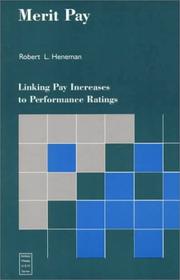| Listing 1 - 9 of 9 |
Sort by
|
Book
ISBN: 9789264031036 Year: 1993 Publisher: Paris : OECD Publishing,
Abstract | Keywords | Export | Availability | Bookmark
 Loading...
Loading...Choose an application
- Reference Manager
- EndNote
- RefWorks (Direct export to RefWorks)
This publication reviews performance pay schemes covering middle management and senior management levels in departments and agencies of central government and also looks at, on a selective basis, schemes for managers in other parts of the public sector. The objectives of the study were to investigate why performance-related pay schemes are being introduced at management levels in the public sector, to examine how these schemes operate, to assess whether the schemes are meeting their stated objectives, and tosee whether and under what conditions performance pay can operate successfully in public sector settings.
Governance --- Government executives --- Merit pay --- Salaries, etc --- Rating of --- Merit increases --- Merit pay programs --- Merit pay systems --- Merit-type salary schedules --- Pay for performance --- Salary schedules, Merit-type --- Variable pay --- Performance awards --- Wages --- Executives --- Public officers
Book
ISBN: 9783110315752 3110315750 Year: 2013 Publisher: Berlin DE GRUYTER
Abstract | Keywords | Export | Availability | Bookmark
 Loading...
Loading...Choose an application
- Reference Manager
- EndNote
- RefWorks (Direct export to RefWorks)
Arbeitnehmer werden nicht mehr nur als Kostenfaktor betrachtet, der möglichst minimiert werden sollte, vielmehr wird ihnen ein Anteil an der Wertschöpfung beigemessen. Ihr Beitrag zum Unternehmenserfolg in Form ihrer Arbeitsleistung soll entsprechend honoriert werden.Diese Erkenntnisse führten zur Idee der variablen Vergütungssysteme. Diesen ist immanent, dass sie gleichzeitig eine Anreizwirkung und eine Belohnungsfunktion innehaben. Zum einen werden Mitarbeiter zu höheren Leistungen motiviert und für diese mit einem leistungs- bzw. erfolgsabhängigen Vergütungsbestandteil entlohnt. Zum anderen wird dabei eine Übereinstimmung der Handlungen der Arbeitnehmer mit den Unternehmenszielen angestrebt. Arbeitgeber müssen bei der Ausgestaltung variabler Vergütungssysteme sehr genau auf die Formulierung achten. Die Rechtsprechung des BAG fordert, dass diese Systeme klar und transparent ausgestaltet sind. Unklarheiten gehen im Zweifel zulasten des Unternehmens.
Wage payment systems. --- Merit pay. --- Merit increases --- Merit pay programs --- Merit pay systems --- Merit-type salary schedules --- Pay for performance --- Salary schedules, Merit-type --- Variable pay --- Performance awards --- Wages --- Pay structure --- Compensation / Law, compensation systems.
Book
ISBN: 9264007563 Year: 2005 Publisher: Paris : OCDE,
Abstract | Keywords | Export | Availability | Bookmark
 Loading...
Loading...Choose an application
- Reference Manager
- EndNote
- RefWorks (Direct export to RefWorks)
Une augmentation de salaire pour récompenser une meilleure performance : une telle politique peut-elle être bénéfique dans le secteur public ? Ce livre présente une vue d’ensemble des politiques de rémunération liée aux performances (RLP) dans l'administration. Il rend compte de l’expérience de 14 pays au cours des 20 dernières années. Il examine aussi bien les avantages que les faiblesses des politiques de RLP. Cet ouvrage explore les diverses voies empruntées par les pays pour mener à bien leurs réformes. Il s’attache à comprendre les raisons pour lesquelles les politiques de RLP sont mises en œuvre et comment ces politiques opèrent concrètement. Les résultats des politiques de RLP sont évalués tant au niveau de l'individu qu'au niveau des équipes. Des recommandations sont proposées pour faciliter la mise en œuvre des politiques de RLP et éviter certains obstacles. Ce livre, qui puise largement dans les rapports préparés par les pays, tire les leçons de deux décennies d'expérience en matière de politiques de RLP. Il évalue également l’impact de ces politiques sur l'efficience du secteur public. Pays couverts Allemagne, Canada, Chili, Corée, Danemark, Espagne, Finlande, France, Hongrie, Italie, Nouvelle-Zélande, Royaume-Uni, Suède et Suisse.
Merit pay --- Compensation management --- OECD countries --- Officials and employees --- Salaries, etc. --- Compensation administration --- Wage and salary administration --- Merit increases --- Merit pay programs --- Merit pay systems --- Merit-type salary schedules --- Pay for performance --- Salary schedules, Merit-type --- Variable pay --- OECD member countries --- Organisation for Economic Co-operation and Development countries --- Personnel management --- Wages --- Performance awards
Book
ISBN: 0191648582 129939731X 9780191648588 9781299397316 9780191749407 0191749400 9780199669806 0199669805 Year: 2013 Publisher: Oxford Oxford University Press
Abstract | Keywords | Export | Availability | Bookmark
 Loading...
Loading...Choose an application
- Reference Manager
- EndNote
- RefWorks (Direct export to RefWorks)
The compensation packages of a growing proportion of firms include pay schemes that are linked to employee or company performance, yet little is known about the patterns of performance related pay. This book compares US and European CEOs to investigate the evolution of executive compensation, its controversies, and its resulting regulations.
Executives --- Merit pay. --- Salaries, etc. --- Merit increases --- Merit pay programs --- Merit pay systems --- Merit-type salary schedules --- Pay for performance --- Salary schedules, Merit-type --- Variable pay --- Performance awards --- Wages --- Executive compensation --- Salaries, pensions, etc. --- Merit pay --- Executive ability --- Business executives --- Company officers --- Corporate officers --- Corporation executives --- Managers --- Management --- Administrative ability --- Executive skills --- Ability --- Salaries, etc --- E-books

ISBN: 0201525046 Year: 1992 Publisher: Reading (Mass.) Addison-Wesley
Abstract | Keywords | Export | Availability | Bookmark
 Loading...
Loading...Choose an application
- Reference Manager
- EndNote
- RefWorks (Direct export to RefWorks)
Compensation management --- Merit pay --- 65.015 --- Merit increases --- Merit pay programs --- Merit pay systems --- Merit-type salary schedules --- Pay for performance --- Salary schedules, Merit-type --- Variable pay --- Performance awards --- Wages --- Compensation administration --- Wage and salary administration --- Personnel management --- 65.015 Work study and analysis. Method study --- Work study and analysis. Method study

ISBN: 9264007539 9789264007550 9789264007536 9786610356133 1280356138 9264007555 Year: 2005 Publisher: Paris : OECD,
Abstract | Keywords | Export | Availability | Bookmark
 Loading...
Loading...Choose an application
- Reference Manager
- EndNote
- RefWorks (Direct export to RefWorks)
This report presents an overview of performance-related pay policies (PRP) for government employees in selected OECD member countries over the past two decades. Both the strengths and the weaknesses of PRP policies are assessed. The report explores the various paths of reform in each country, investigating the reasons why PRP policies are being implemented and how the policies operate concretely. The outcomes of PRP policies at the individual and team levels are evaluated, and recommendations are made on what should be done or avoided with the implementation of PRP. The report includes a number of case studies.--Publisher's description.
Sociology of policy --- Personnel management --- Merit pay --- Compensation management --- OECD countries --- Officials and employees --- Salaries, etc. --- Compensation administration --- Wage and salary administration --- Wages --- Merit increases --- Merit pay programs --- Merit pay systems --- Merit-type salary schedules --- Pay for performance --- Salary schedules, Merit-type --- Variable pay --- Performance awards --- OECD member countries --- Organisation for Economic Co-operation and Development countries
Book
ISBN: 9264138234 9264031030 Year: 1993 Publisher: Paris OECD
Abstract | Keywords | Export | Availability | Bookmark
 Loading...
Loading...Choose an application
- Reference Manager
- EndNote
- RefWorks (Direct export to RefWorks)
Government executives --- Merit pay --- 331.2 --- 334.7 --- 336.1 --- Merit increases --- Merit pay programs --- Merit pay systems --- Merit-type salary schedules --- Pay for performance --- Salary schedules, Merit-type --- Variable pay --- Performance awards --- Wages --- 334.7 Diverse economische organisatievormen. Particuliere ondernemingen. Semioverheidsbedrijven. Openbare bedrijven. Overheidsbedrijven. Staatsbedrijven. Multinationals. Grootbedrijf. Middenbedrijf. Kleinbedrijf --- Diverse economische organisatievormen. Particuliere ondernemingen. Semioverheidsbedrijven. Openbare bedrijven. Overheidsbedrijven. Staatsbedrijven. Multinationals. Grootbedrijf. Middenbedrijf. Kleinbedrijf --- 336.1 Public finance, government finance in general --- Public finance, government finance in general --- 331.2 Loon. Salaris. Vergoeding --(algemeen) --- Loon. Salaris. Vergoeding --(algemeen) --- Executives --- Public officers --- Rating of --- Salaries, etc
Book
ISBN: 1283223058 9786613223050 0833052543 0833052519 9780833052544 9780833052520 0833052527 9780833052513 9781283223058 6613223050 Year: 2011 Publisher: Santa Monica, CA Rand
Abstract | Keywords | Export | Availability | Bookmark
 Loading...
Loading...Choose an application
- Reference Manager
- EndNote
- RefWorks (Direct export to RefWorks)
For three school years, from 2007 to 2010, about 200 high-needs New York City public schools participated in the Schoolwide Performance Bonus Program, whose broad objective was to improve student performance through school-based financial incentives. An independent analysis of test scores, surveys, and interviews found that the program did not improve student achievement, perhaps because it did not motivate change in educator behavior.
Academic achievement -- New York (State) -- New York. --- Merit pay -- New York (State) -- New York. --- School improvement programs -- New York (State) -- New York. --- Teachers -- Salaries, etc. -- New York (State) -- New York. --- Teachers --- Merit pay --- School improvement programs --- Academic achievement --- Education --- Social Sciences --- Theory & Practice of Education --- Salaries, etc --- Salaries, etc. --- Academic underachievement --- Achievement, Academic --- Educational achievement --- Scholastic achievement --- Scholastic success --- School achievement --- Student achievement --- Underachievement, Academic --- Improvement programs, School --- Instructional improvement programs --- Programs, School improvement --- School self-improvement programs --- Merit increases --- Merit pay programs --- Merit pay systems --- Merit-type salary schedules --- Pay for performance --- Salary schedules, Merit-type --- Variable pay --- Faculty (Education) --- Instructors --- School teachers --- Schoolteachers --- Performance --- Success --- School management and organization --- Performance awards --- Wages --- School employees --- Academic performance --- Academic progress --- Academic success --- Achievement, Scholastic --- Achievement, Student --- Performance, Academic --- Progress, Academic --- School success (Academic achievement) --- Success, Academic --- Success, School (Academic achievement) --- Success, Scholastic
Book
ISBN: 9780674916593 067491659X Year: 2021 Publisher: Cambridge, Massachusetts The Belknap Press of Harvard University Press
Abstract | Keywords | Export | Availability | Bookmark
 Loading...
Loading...Choose an application
- Reference Manager
- EndNote
- RefWorks (Direct export to RefWorks)
"Setting wages isn't an exact science, but we like to think that our workplace performance provides an objective basis for pay. You're Paid What You're Worth offers a bold theory to the contrary, arguing that pay is decided in contests over interests and ideals-that social conflicts, not economic metrics, determine who gets how much"--
Pay equity --- Equality --- Performance standards --- Wages and labor productivity --- Merit pay --- Annual improvement factor --- Labor productivity and wages --- Wages --- Industrial engineering --- Labor productivity --- Productivity bargaining --- Job performance standards --- Work performance standards --- Work standardization --- Employees --- Goal setting in personnel management --- Egalitarianism --- Inequality --- Social equality --- Social inequality --- Political science --- Sociology --- Democracy --- Liberty --- Comparable worth --- Equal pay for comparable work --- Equal pay for work of comparable value --- Equity, Pay --- Worth, Comparable --- Rating of --- Merit increases --- Merit pay programs --- Merit pay systems --- Merit-type salary schedules --- Pay for performance --- Salary schedules, Merit-type --- Variable pay --- Performance awards --- #SBIB:316.334.2A330 --- #SBIB:316.334.2A340 --- #SBIB:316.334.2A60 --- #SBIB:316.334.2A520 --- Arbeidssociologie: regionale arbeidsmarktstudies --- Arbeidssociologie: ongelijkheden op de arbeidsmarkt: algemeen --- Economische sociologie --- Organisatiesociologie: arbeidssituatie en arbeidsomstandigheden: algemeen
| Listing 1 - 9 of 9 |
Sort by
|

 Search
Search Feedback
Feedback About UniCat
About UniCat  Help
Help News
News